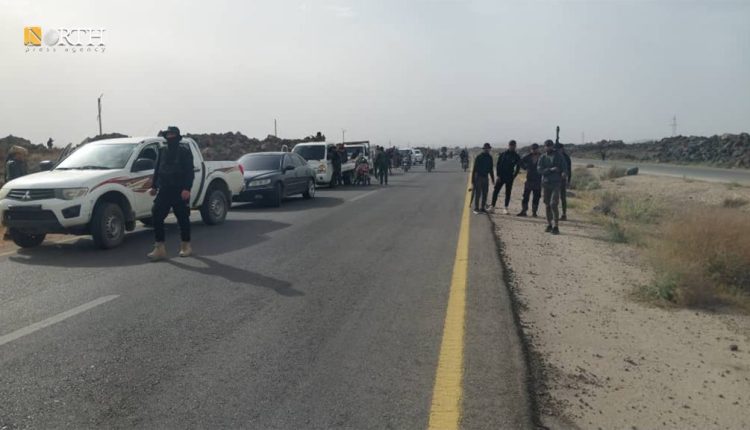Traffic Gradually Resumes on Damascus–Suwayda Road Amid Local Security Efforts
By Kardo Roj
SUWAYDA, Syria (North Press) – The main highway linking Damascus to the southern city of Suwayda witnessed a gradual return to normal traffic on Tuesday, following the partial implementation of a local security agreement between the Syrian government and community leaders from the Druze-majority region.
Local sources told North Press that several buses and vehicles carrying fresh produce, flour, and other essential supplies arrived in Suwayda for the first time in days. The development comes after police units, in coordination with local security forces, began securing the road earlier this week.
The Damascus–Suwayda highway had been largely impassable in recent days due to repeated attacks and blockades by armed groups, putting civilians and commercial traffic at significant risk.
On Sunday, authorities announced the activation of a security arrangement involving internal police and judicial enforcement units drawn from Suwayda’s own population. The agreement was reportedly brokered between government officials and prominent Druze sheikhs and dignitaries, aimed at de-escalating tensions and restoring stability in the area.
“The road is not fully secure yet, but movement has restarted, especially for vehicles carrying food and basic commodities,” a local resident told North Press, requesting anonymity due to safety concerns.
This community-based initiative is part of a broader pattern seen in various parts of Syria, where local forces have increasingly taken on policing roles to fill security vacuums and reduce the influence of irregular armed groups.
In recent weeks, the Damascus–Suwayda route has become a hotspot for security incidents, with reports of ambushes, kidnappings, and roadblocks by non-state actors. This prompted growing demands from civil society groups and local leadership for a sustainable solution to guarantee freedom of movement and access to basic goods.
The disruptions also affected humanitarian deliveries and local markets, exacerbating economic strain in an area already facing high unemployment and deteriorating public services.
“Restoring this road is a lifeline for the city,” said a shop owner in Suwayda. “We’ve been running out of flour and vegetables—things people need every day.”
The approach in Suwayda—rooted in community consent and internal policing—has drawn attention from observers who view it as a potential model for restoring order in other parts of Syria, where central authority remains contested or fragmented.
While the Syrian government retains nominal sovereignty over the region, Suwayda has long been characterized by a degree of local autonomy, especially in matters of security and public administration.
This local governance dynamic echoes similar patterns seen in northeast Syria, where internal security forces drawn from local populations have been instrumental in maintaining order under the framework of the Autonomous Administration of North and East Syria (AANES).
Although the contexts differ, the emphasis on community legitimacy, localized control, and minimizing external interference has proven effective in addressing immediate security needs.
Officials and community leaders in Suwayda say continued coordination between local forces and government institutions is essential to prevent a relapse into lawlessness.
Efforts are underway to secure the entirety of the Damascus–Suwayda corridor, ensuring the safe passage of goods and people and restoring public confidence.
Whether this cooperative model can be sustained—and potentially replicated elsewhere—remains to be seen. However, for now, the cautious reopening of the highway marks a tangible step toward restoring everyday life in one of southern Syria’s most restive provinces.

